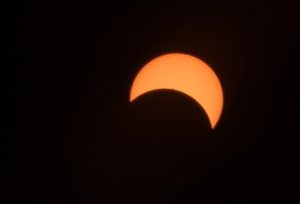If you live in Las Vegas, you’ve probably experienced this. You’re driving on the highway, and you see a big diesel truck with an oversize exhaust pipe. If you happen to be driving a Toyota Prius or any car associated with clean or cleaner energy—or maybe for no reason whatsoever—that pipe hits you and all the drivers in its wake with a thick cloud of smoke.
The “rolling coal” trend, or the practice of installing devices that defeat federally required emissions controls and allow cars to emit sooty fumes, has been around since the Obama administration. It exists to give the finger to environmentalists and emissions control laws seen as onerous and unnecessary.
But not only does rolling coal impact overall emissions, exacerbating climate change; it also pollutes the air, which can lead to health problems, especially for vulnerable populations.
“We know that inhaling these gases is toxic for everyone,” Rodrigo Gonzalez, a community organizer with Chispa Nevada, says through a Spanish language interpreter. “And we know that some diesel truck drivers modify them so there are greater emissions from these trucks.
“It really is a big problem, because it causes harm to people that inhale that smoke. It’s a significant part of contamination, because it emits nitrogen oxides, [so] it can put people at risk of developing asthma, bronchitis and other respiratory infections.”
Part of the League of Conservation Voters, Chispa aims to empower Latinos and other communities of color to advocate for “climate justice,” including clean air, water and healthy communities. Per the organization, communities of color and low-income communities bear the brunt of pollution and its resulting health effects. That belief is supported by the American Lung Association’s State of the Air report, which found that since 2021, people of color are 3.7 times as likely to live in a county with failing air quality grades.
Among other greenhouse gases and pollutants, nitrogen oxides emitted from rolling coal present a direct threat to Chispa’s goals, since the poisonous gases are linked to heart and lung disease and higher rates of cancer and premature death.
According to 2020 estimates from the U.S. Environmental Protection Agency (EPA), more than 550,000 diesel pickup trucks (about 15% of the national population of diesel trucks) partook in removing emissions controls, resulting in an estimated 570,000 tons of excess nitrogen oxides and 5,000 tons of particulate matter or soot emitted over the lifetimes of the vehicles—the equivalent to 9 million extra trucks on the road.
“We’ll continue to fight for this to be outlawed,” in Nevada, Gonzalez says.
Several states have explicitly outlawed the practice. Nevada has not, but the Department of Motor Vehicles (DMV) has a SmogSpotter program, which allows anyone to report a car that they believe to be overemitting.
In 2022, the DMV received 6,723 reports of vehicles that were smoking (not necessarily rolling coal). The agency issued 3,221 notices, “some of which do require vehicle owners to present their vehicles at a State Emissions Lab for testing,” DMV spokesman Eli Rohl says in a statement. “Noncompliant vehicles get their registrations canceled or holds placed on upcoming registrations until their vehicle is brought into compliance.”
Classic Cars
As part of its clean air mission, Chispa advocated for a law that went into effect in January, cracking down on classic car registrations. “A lot of the cars that are classified as a classic are really just old and emit a lot of smoke,” Gonzalez says.
The DMV saw an increase over 10 years from 5,000 to 32,000 cars in the classic vehicle category, according to Clark County’s website. Officials have said the increase largely stems from car owners not being able to pass a smog check and using the classic vehicle registration as a way to work around the test.
Thanks to lawmakers and the advocacy of organizations like Chispa, current law requires all owners of vehicles registered as classic cars to hold classic vehicle insurance policies. By legal definition, a classic car cannot be driven more than 5,000 miles per year or used for commercial purposes.
All other vehicles must pass a smog check to receive a Nevada license plate. The Smog-Free Clark County program provides up to $975 in assistance for income-eligible residents to repair vehicles in order to pass emissions tests.
Transportation Electrification
According to the county’s All-In Community Sustainability and Climate Action Plan, transportation is the second-largest source of greenhouse gas emissions in the region and state.
Kevin MacDonald, a spokesman for Clark County’s Department of Environment and Sustainability, says there’s a correspondence between emissions and smog, defined as “a mixture of pollutants made up of mostly ground-level ozone.”
“Emissions from vehicles and other sources are a contributing factor to smog, which is bad for air quality,” MacDonald tells the Weekly in a statement. “Combustion engines contribute to both greenhouse gas emissions and regulated pollutants such as carbon monoxide, nitrogen dioxide, particulate matter and volatile organic compounds.”
Moreover, vehicle emissions exacerbate climate change by pumping more greenhouse gases into the atmosphere. The county, state and federal government are turning to electrification of the transportation sector as a solution to emissions and air quality problems.
Chispa Nevada is seizing the opportunity with a push for electric school buses. “Chispa [brought] forth the Clean Buses for Healthy Niños initiative to substitute diesel school buses for electric ones,” Gonzalez says. “In June, we started to see the fruits of that in the parking lot on Arville. Chispa; volunteers and allies saw two electric buses acquired by the Clark County School District.”
After the Biden-Harris administration announced nearly $95 million for the EPA’s clean school bus program, CCSD will receive $9.8 million to purchase 25 zero-tailpipe-emission electric school buses and charging stations.
Click HERE to subscribe for free to the Weekly Fix, the digital edition of Las Vegas Weekly! Stay up to date with the latest on Las Vegas concerts, shows, restaurants, bars and more, sent directly to your inbox!



